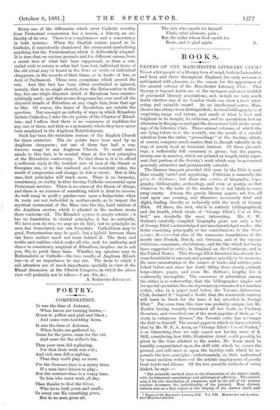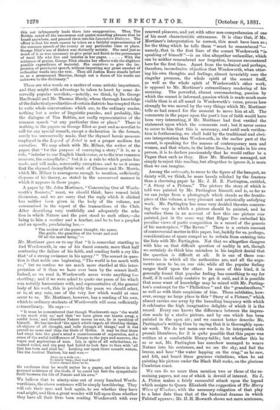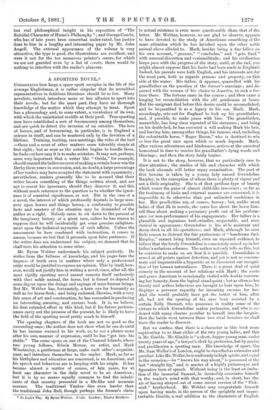BOOKS.
PAPERS OF THE MANCHESTER LITERARY CLUB.* To not a few people of a literary turn of mind, both in Lancashire and here and there throughout England, the early autumn is anticipated with pleasure, as the season for the appearance of the annual volume of the Manchester Literary Club. This Society is beyond doubt one of the strongest and most fruitful of provincial literary associations, and, indeed, we very much doubt whether any of its London rivals can show a more inter- esting and valuable record. As an intellectual centre, Man- chester has always been distinguished ; its local bibliography is of surprising range and extent, and much of what is best and brightest in its insight, its criticism, and its speculation find an utterance in the papers read and the discussions held at the meet- ings of its Literary Club. These annual volumes, of which the one lying before us is the seventh, are the result of a careful selection from the entire " proceedings " of the Society, which, of course, comprise much matter that is, though valuable in its way, of purely local or transient interest. Of these proceed- ings, a sufficiently full summary is given ; but the papers, twenty-one in number, which are printed at length, fairly repre- sent that portion of the Society's work which may be accounted generally attractive and permanently valuable.
The literary banquet provided this year by the Club is more than usually varied and appetising. Criticism is naturally the pil;ce de resistance, but there are entrees of biography, topo- graphy, bibliography, archwology, and even of poetry, so that whatever be the taste of the reader, he is not likely to come away empty. Among the purely literary papers are five, all read upon one evening, and therefore necessarily brief and slight, dealing directly or indirectly with the work of George Eliot. Of these, the first, which is entirely bibliographical, and the fourth, which treats of "George Eliot's Use of Dia-
lect," are decidedly the most interesting. Mr. C. W. Sutton's carefully compiled biography gives not only a list of George Eliot's acknowledged and unacknowledged works—the latter consisting principally of her contributions to the West-
minster Review—but also of the numerous translations of the novels into French, Dutch, and German, and of the various criticisms, comments, elucidations, and the like which her books have suggested to critics in England, on the Continent, and in the United States. This George Eliot literature has already be- come formidable in amount, and promises speedily to be more so ; the mere enumeration of the names of books and articles pub- lished before and since her death filling three closely-printed, large-octavo pages, and even Mr. Sutton's lengthy list is confessedly incomplete. The consensus of admiration among the critics is so noteworthy, that the bibliographer singles out for special quotation the one depreciatory estimate of a Canadian writer, who, in a paper read before the Toronto Atheninum Club, declared it "beyond a doubt that the nineteenth century will learn to blush for the fame it has accorded to George Eliot." For some time this view was probably unique, but Mr. Ruskin having recently denounced all her books as Cockney
literature, and described one of the most popular of them as "a study in cutaneous disease," the Toronto critic has no longer the field to himself. The second paper to which we have referred, that by Mr. W. E. A. Axon, on" George Eliot's Use of Dialect," is so interesting, that we only regret not having more of it. Still, considering how little illustrative detail could possibly be
given in the time allotted to the reader, Mr. Axon must be heartily congratulated upon the skill with which he covers the ground, and still more so upon the lucidity with which he ex- pounds the true principles—unfortunately, so little understood by many modern writers—of the artistic employment of purely
local words and idioms. Of the two possible methods of using dialect, he says :— " The scientific method aims at the illustration of the dialect itself, with its historical associations and philological affinities. The artistic uses it for the elucidation of character, and by the aid of its minute touches increases the individuality of the portrait. Most dialect- writers aim as a first object at the display of the dialect itself, and Papers of the Manchester Literary Club. Vol. VU. Manchester and London : Abel Heywood and Son. this not infrequently leads them into exaggeration. Thus, Tim Bobbin noted all the uncommon and quaint-sounding phrases that he heard anywhere, and pressed them into his Lancashire Dialogue. The effect is that his work cannot be taken as a faithful representation of the common speech of the county at any particular time or place. George Eliot's use of dialect was distinctly artistic. She used just so much of it as was necessary to give point and finish to the personages of rural life who live and breathe in her pages With the reticence of genius, George Eliot obtains her effects with the slightest possible expenditure of material. She contrives to give the im- pression of provincial speech, without importing any great number of unfamiliar words into the text. Thus old Joshua Hann stands before us as a pronounced Mercian, though not a dozen of his words are unknown to the dictionary."
These are wise words on a matter of some artistic importance, and they might with advantage be taken to heart by some de- servedly popular novelists,—notably, we think, by Dr. George MacDonald and Mr. Thomas Hardy, whose thorough knowledge of the dialectical peculiarities of certain districts has tempted them to write whole conversations which are, to the ordinary reader, nothing but a series of linguistic puzzles, and probably, like the dialogue of Tim Bobbin, not really representative of the common speech "at any particular time or place." There is nothing in the papers on George Eliot as poet and as novelist to call for any special remark, except a declaration in the former, surely too unreservedly made, that The rhymed heroic measure employed in the Legend of jubal is not a proper medium for narrative. We may admit with Mr. Milner, the writer of the paper, that "for the purpose of conveying a story," it is, as a rule, "inferior to our English blank-verse, or to the true romance measure, the octosy]labic ;" but it is a rule to which genius has made, and will make, noteworthy exceptions, and to us it seems that the rhymed decasyllabic work of Chaucer and Mr. Morris, which Mr. Milner is courageous enough to mention, sufficiently disposes of his theory, as stated in the unreserved manner in which it appears in these pages.
A paper by Mr. John Mortimer, "Concerning One of Words- worth's Sonnets," must, we should think, have roused brisk discussion, and we are sorry that the reply which it elicited has neither been given in the body of the volume, nor summarised in the report of the transactions of the Club.
After describing very truthfully and adequately the rela- tion in which Nature and the poet stood to each other,—she being to him a soother and a teacher, and he to her a prophet and an apostle, proclaiming her,—
" The anchor of the purest thought, the nurse, The guide, the guardian of the heart and soul Of all the moral being,"— Mr. Mortimer goes on to say that "it is somewhat startling to
find Wordsworth, in one of his finest sonnets, more that half confessing the failure of his faith, and sending forth a cry like that of a strong swimmer in his agony.'" The sonnet in ques- tion is that noble one beginning, "The world is too much with us ;" but we confess we are much more startled at this inter- pretation of it than we have ever been by the sonnet itself. Indeed, as we read it, Wordsworth never wrote anything less startling ; and if we were asked to quote one poem of his which was notably harmonious with, and representative of, the general body of his work, this is probably the poem we should select, or is, at any rate, one of the very few which would at once occur to us. Mr. Mortimer, however, has a reading of his own, which to ordinary students of Wordsworth will seem sufficiently extraordinary. He says :—
"It must be remembered that though Wordsworth says the world is too much with us,' and that we have given our hearts away, a sordid boon,' and therefore Nature moves us not, he is speaking of himself. He has invoked the spirit which impels all thinking things, all objects of all thought, and rolls through all things,' and it has proved no more real than the Gods of Hellas. It may be that there had crept into the poet's mind a consciousness of separation, and a sense of the awful indifference of Nature to the joys and sorrows, the hopes and aspirations of men. Isis, in spite of all solicitations, re- mained veiled, and the poet had failed to look face to face with 'all that has been and shall be: Looking out upon those moonlit waters, like the Ancient Mariner, his soul was,—
Alone on a wide sea : So lonely 'twaa, that God himself Scarce seemed there to be.
He confesses that he would rather be a pagan, and believe in the personal existence of the Gods, if he could but feel the sympathetic thrill between the life of Nature and his own."
We believe that to ninety-nine out of every hundred Words- worthians, the above sentences will be simply bewildering. They will rub their eyes and look again, to see whether they have read aright, and then a great wonder will fall upon them whether they have all their lives been reading Wordsworth with ever
renewed pleasure, and yet with utter non-comprehension of one of his most characteristic utterances. It is clear that, if Mr. Mortimer's interpretation be correct, this must have been so ; for the thing which he tells them "must be remembered "— namely, that in the first lines of the sonnet Wordsworth "is speaking of himself "—is an idea altogether unfamiliar, which can be neither remembered nor forgotten, because encountered here for the first time. Apart from the technical and perhaps, therefore, inconclusive objection that Wordsworth, when utter- ing his own thoughts and feelings, almost invariably uses the singular pronoun, the whole spirit of the sonnet itself, as well as the whole spirit of Wordsworth's other work, is opposed to Mr. Mortimer's extraordinary rendering of his meaning. The powerful, almost overmastering, passion by which the sonnet is informed, passion which is made much more visible than is at all usual in Wordsworth's verse, proves how strongly he was moved by the very things which Mr. Mortimer tells us had ceased for the moment to move him at all. The comments in the paper upon the poet's loss of faith would have been very interesting, if Mr. Mortimer had first verified the statement upon which the comments rest ; but it never seems to occur to him that this is necessary, and until such verifica- tion is forthcoming, we shall hold by the traditional and obvi- ous interpretation that Wordsworth, in the earlier part of the sonnet, is speaking for the masses of contemporary men and women, and that where, in the latter lines, he speaks in his own person, it is to declare passionately that he would rather be a Pagan than such as they. How Mr. Mortimer managed, not simply to reject this reading, but altogether to ignore it, is more than we can imagine.
Among the entremets, to recur to the figure of the banquet, no dainty will, we think, be more keenly relished by the feasters than a charming paper by Mr. J. H. E. Partington, entitled, " A Story of a Picture." The picture the story of which is told was painted by Mr. Partington himself, and is, so far as we can judge from a photograph which stands as the frontis- piece of this volume, a very pleasant and artistically satisfying work. Mr. Partington has some very decided theories concern- ing the way in which a picture should be painted, and he embodies them in an account of how this one picture was painted, just in the same way that Edgar Poe embodied his peculiar views of poetic composition in a record of the genesis of his masterpiece, "The Raven." There is a certain amount of controversial matter in this paper, but, luckily for US, perhaps, considerations of space compel us to refrain from entering into the lists with Mr. Partington. Not that we altogether disagree with him on that difficult question of nudity in art, though we certainly do think him mistaken in his implicit denial that the question is difficult at all. It is one of those con- troversies in which all the authorities are, and all the argu- ments seem to be, on one side, while all the. popular feeling ranges itself upon the other. In cases of this kind, it is generally found that popular feeling has something to say for itself, if it could only contrive to get it said, and it is possible that some want of knowledge may be mixed with Mr. Parting- ton's contempt for the "Philistines " and the "grandmothers," as well as with their suspicions of him. These subtleties, how- ever, occupy no large place in this "Story of a Picture," which almost carries one away by the bounding buoyancy with which it celebrates the high imaginative delights of which it is the record. Every one knows the difference between the impres- sion made by a studio picture, and by one which has been painted in the open air ; and we cannot better describe Mr.
Partington's writing than by saying that it is thoroughly open- air work. We do not mean our words to be interpreted with prosaic literalness, for it is quite possible that this paper was written at a comfortable library-table ; but whether this be so or not, Mr. Partington has somehow managed to weave Nature into his sentences, and we see the sky, and feel the breeze, and hear "the water lapping on the crag," as he saw, and felt, and heard these gracious visitations, when he sat painting his picture under the Black Hall rocks, on the glorious Cambrian coast.
We can do no more than mention two or three of the re- maining papers, not one of which is devoid of interest. Sir J.
A. Picton makes a fairly successful attack upon the legend which assigns to Queen Elizabeth the suggestion of The Merry Wives of Windsor, with the necessary relegation of that play to a later date than that of the historical dramas in which Falstaff appears ; Mr. H. H. Howarth shows not mere acuteness,. but real philosophical insight in his exposition of "The Suicidal Character of Hume's Philosophy"; and George Combe, who has of late years been somewhat under-rated, has justice done to him in a lengthy and interesting paper by Mr. John Angell. The external appearance of the volume is very attractive, the type is good, the illustrations are excellent, and were it not for the too numerous printer's errors, for which we are not guarded even by a list of errata, there would be nothing to interfere with the reader's pleasure.
































 Previous page
Previous page